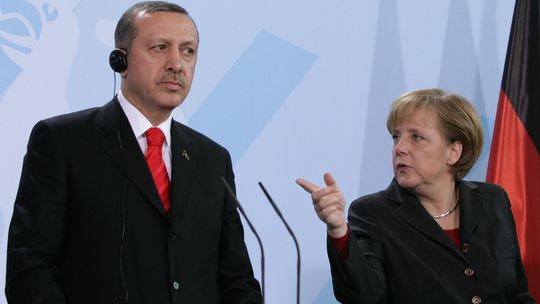 Over the past two and a half centuries, relations between Turkey and Germany have come a long way – from the Prussian-Turkish friendship agreement in 1761 to a sui generis rivalry at the beginning of the new millennium. The two countries are now using the Balkans as a soft power battleground, argues former Serbian ambassador to Turkey Dušan Spasojević.
Over the past two and a half centuries, relations between Turkey and Germany have come a long way – from the Prussian-Turkish friendship agreement in 1761 to a sui generis rivalry at the beginning of the new millennium. The two countries are now using the Balkans as a soft power battleground, argues former Serbian ambassador to Turkey Dušan Spasojević.

Although the two powers have not been faced in a direct confrontation since the second siege of Vienna in 1683, Turkish-German relations have recently been on a downward slide. One of the reasons of disagreement is to be found in the Balkans. The roots of Turkish-German rivalry in the region lie deep, and can today be noticed in a newly found Empire nostalgia, which is particularly marked in the neo-ottomanist discourse of the current chief of Turkish diplomacy, Ahmet Davutoğlu.
The lowest common denominator of Turkish and German interests in Balkan politics has long been to curb down Serbian influence in the peninsula. This aim was reached through the disintegration of Yugoslavia, thus lifting the last barrier for the return of both countries’ ascendancy in the peninsula – and that is precisely when the first tensions between Ankara and Berlin started. Erdogan’s Turkey sees in Germany the main obstacle on its way to Europe, for which it intends to use the Balkans as springboard. Angela Merkel’s Germany sees Ankara as a disturbing factor in the assertion of its domination over Europe.
It is no secret that Germany is the EU member state most opposed to Turkey’s entry into the club. Rubbing salt into an open wound, chancellor Merkel is offering Turkey a “privileged partnership” in lieu of fully-fledged accession. Ankara turns a deaf ear to this proposal which it believes to be, not without good reason, indecent. What makes the Balkan region a particularly interesting scenery for the German-Turkish rivalry is the fact that the Balkans are the place that represents, for Turkey, the source of its European legitimacy – the place whereby today’s Turkey asserts its Western identity [by its historical presence on that territory].
In the past few years, Ankara and Berlin have most often confronted themselves in Bosnia and Herzegovina. For instance, when Germany was pushing for the Office of the High Representative to pass under the supervision of the EU, Turkey was against it. When Ankara was insisting for BiH to join NATO, Berlin vetoed its progress. The reason is simple. Germany plays a secondary role in NATO and the membership of Balkan countries in the alliance weakens the importance of Berlin’s role in the region. On the other hand, every step the Balkans take towards the German-dominated EU diminishes the influence of Ankara, stuck in the club’s waiting room for decades.
Even though Ankara and Berlin were among the first countries to recognise Kosovo’s unilateral declaration of independence, the sui generis rivalry between these two countries is being played out over this issue as well. While German generals are following one another at KFOR’s leadership positions, the Turkish troops located in the southern outskirts of the territory act as mere decoration. Erdogan’s extravagant statement that “Kosovo is Turkey, and Turkey Kosovo” needs to be contextualised as the consequence of a frustration: in spite of all the efforts of Turkish diplomacy in promoting Kosovo’s independence, Ankara has been completely left out of the talks between Belgrade and Prishtina, held under the auspices of the EU. In the neo-ottomanist conception, Turkey’s ambition to be an important player in the Balkans relies on the Muslim communities, as a key stronghold of pro-Turkish support, for the realisation of its impact. For the time being, however, the majority of Balkan Muslims see as their protecting power not Turkey, but the EU – and the Balkan’s European perspective depends chiefly on Germany’s goodwill.
The role of Serbia in the Balkan muscle-flexing between Ankara and Berlin is not insignificant, nor is it easy. The Istanbul declaration signed in April 2010. was perceived by Berlin like a finger in the eye: a green light from Belgrade to Turkey’s entry in the Balkans. On the other hand, Serbia’s new government has unequivocally decided for “more Germany in the Balkans”, in the words of PM Vučić. In the Balkan count, more Germany equals less Turkey. How much will be left of the “Balkans to the Balkan people” – as the old Balkan League adage & Yugoslav unification motto went – remains an unknown in this equation.
This article was first published in its Serbian original by NIN.
Note: This article gives the views of the author, and not the position of LSEE Research on SEE, nor of the London School of Economics.
___________________________
Dušan Spasojević is a Serbian politician and diplomat. He has held positions in the Ministry of Internal Affairs, Ministry of Defence and in the cabinet of the President of the Republic of Serbia. From 2011 to 2013 Mr Spasojević served as Serbian Ambassador to Turkey. He is a barrister by training and an LSE alumnus. He tweets @DS_Spasojevic




All fine, but why do we always have to have Serbian intellectuals attributing guilt for “the disintegration of Yugoslavia” to anyone else, but the Serbs themselves?
All is fine indeed. I have read this outstanding analysis over and over again, but could not find this “attribution of guilt for the disintegration of Yugoslavia” at all. Ambassador Spasojevic, funnily enough, does not blame anyone, he merely notifies that Yugoslavia did fall apart. What I, as a Croat, tend to blame Serbs for is creating Yugoslavia. Such a shame we destroyed it…